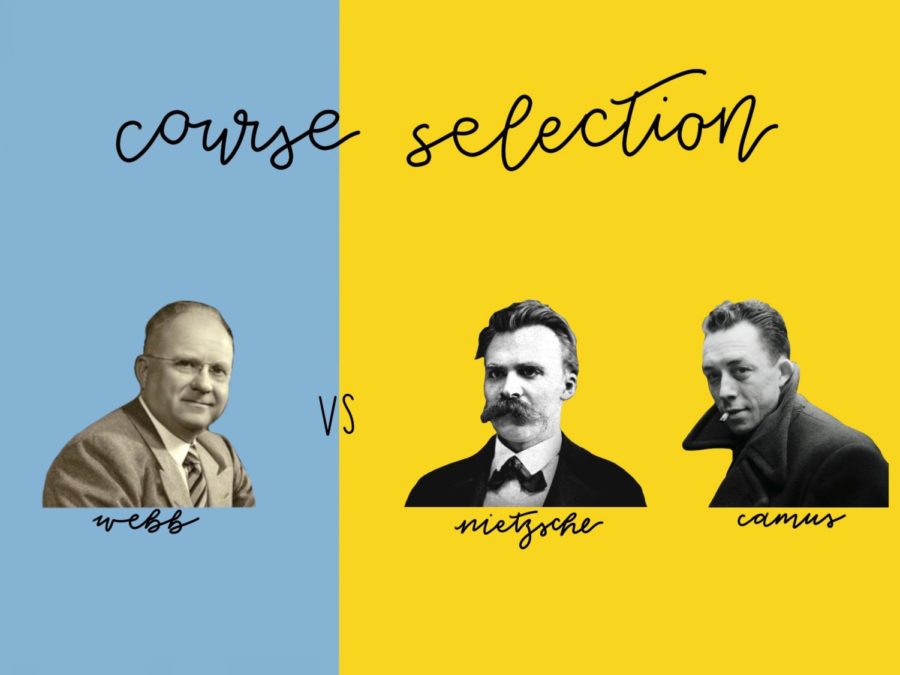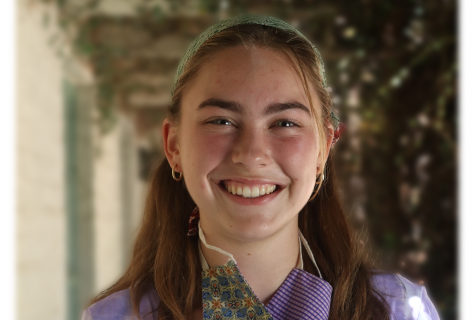We are well into quarter three; course selection is nigh. After taking Advanced Studies Existentialism and the Human Condition last semester, I have realized that course recommendations are much more restrictive than we think in terms of existential concepts.
In the class we learned about lots of philosophers, and in this article, I would love to quickly introduce you to two of them: Friedrich Nietzsche and Albert Camus.
- “The greatest fruitfulness and the greatest enjoyments of existence is: to live dangerously!” – Nietzsche
Nietzsche means you are going to die, so live life to the fullest and do not avoid pain. In his eyes, living comfortably is not productive because pain is what drives us to make change and seek lasting happiness.
- “One must imagine Sisyphus happy.” – Camus
Camus is referring to the myth where a greedy king, Sisyphus, is sentenced in the afterlife to roll a boulder up a hill, only to have it roll back down just before he reaches the top. Through this myth, Camus draws out attention to the fact that as creatures of habit, humans repeat the same mundane tasks every day, and often struggle in the process. Yet, we are still alive; we stay alive and continue to struggle, even though we could just die instead. So, humans must enjoy the struggle. Sisyphus is happy.
But all this talk of pain and happiness and course selection started with a typical Webb Harkness discussion, when in Existentialism class pondered whether students can be authentic at Webb.
The immediate two or three responses were positive: “I can be authentic at Webb because I can try all the sports,” and “I can be authentic at Webb because I live independently,” and “I can be authentic at Webb because I am able to pursue the subjects I am curious about.”
“Wait a minute,” I thought. “I cannot be authentic at Webb because I am not allowed to take the classes I want to. I cannot be authentic to my curiosity.”
I am referring specifically to the recommendation system in the humanities department. For example, if a student is not recommended for advanced studies courses, they would not be allowed to learn about fascism, or existentialism, or modernist literature, or other important material. These recommendations are made on the basis that faculty members do not feel a student is ready to take an advanced course.
Webb teachers also tell students that we learn and grow through challenge and struggle. According to Camus, humans enjoy the struggle. According to Nietzsche, we must experience pain and hardship to make valuable changes in our lives. Yet, Webb discourages its students to further challenge themselves academically … quite the contradiction.
“Sometimes part of the learning process is embracing the struggle,” said Greg Gerken, Co-Chair of the Humanities Department. “Part of being a scholar is learning how to make decisions for ourselves and the reasons why we make them.”
Struggling is a way for us to learn how we function and learn and become more in-touch with ourselves.
“I think that in order to improve the exploration of our individuality, it’s crucial that we explore the topics that interest us, so the loss of the ability to take classes which cover those interests in a way denies our individuality,” Hunter Lange (’22) said.
Part of Webb’s mission is also to create leaders through education. If our interests, which are the foundation of our individuality, is stifled, how can we be real leaders in the future?
Mr. Gerken explained that part of the reason for the recommendation system is to provide students with adequate challenge which will not damage confidence in their ability to succeed in an academic setting.
Another aspect of Camus’s interpretation of Sisyphus is, however, that Sisyphus has no hope. He knows he will never push the boulder to the top of the hill, so that when is does inevitably fall, he experiences no tragedy. We students though, hold onto the hope that we will be recommended for all courses, so that when we are not, the unfairness of the situation is disheartening. Or, if we do end up taking classes that are difficult, a lower grade becomes devastating. If we hold onto hope, we may experience tragedy, but some would say without optimism there is less joy.
“On the one hand, a structured foundation would help the scholar acquire more knowledge for their academic toolkit and would prepare them for later stages of learning,” Angeline Zhang (‘21) said. “On the other hand, I do see people who think like [noted existentialist] Sartre: ‘let me make my own choices, even if it results in my doom.’ However, to do that you either have to own up to the consequences, like getting a GPA you might not feel content with, or just abolish the higher education admissions system as we know it. In my opinion, … there are more important paradigms to fight than the Webb humanities department.”
Angeline makes a valid point about the importance of a foundation, but education in certain areas is vital to be able explore and criticize those areas in discussion. For example, many of the students I have spoken to, who recently finished their Advanced Studies in Fascism class, can recognize fascist policy and behaviors all throughout American politics, especially after the recent capitol riot. I have not taken fascism and was not able to make those connections, simply because I am not familiar with the subject matter.
Restricting students from taking difficult classes is more damaging than helpful. This limitation steals the opportunity for struggle, like dealing with a lower grade and learning from that experience, and the possibility to make improvements as a result. It steals an individual’s ability to make choices, something essential to the freedom humans are born with. Therefore, course recommendations limit freedom, and individuality, and life.
“A common thought that I am hearing from students is that kids should be able to choose to fail,” I said to Mr. Gerken.
“I think there is a part of me that agrees with that,” Mr. Gerken said. “But it’s hard sometimes, looking at that bigger picture and taking not just the individual, but the whole into account.”







![Student loan borrowers rally near the White House for Joe Biden to cancel all student loans. Biden, pictured left, is troubled with diminishing popularity with youth as he fails to forgive all students loans as he had promised. “[Biden] kind of fumbled things even though he tried with student loan forgiveness,” said Cory Warren, humanities department faculty. “That was [the] number one campaign promise to get the youth vote.” Whether it is student loans, age, or foreign policy, what, ultimately, drives away the youth vote for Biden?](https://webbcanyonchronicle.com/wp-content/uploads/2024/03/Duan-biden-popularity-1200x675.jpeg)



Stephen Caddy | Mar 8, 2021 at 12:40 PM
Great piece Nicola. I took a few philosophy classes when I was in university and you’ve really hit the nail on the head here!